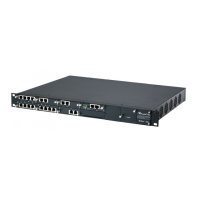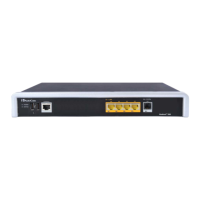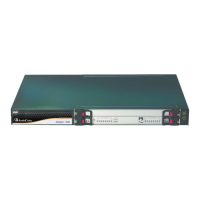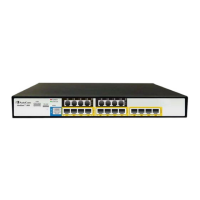User's Manual 884 Document #: LTRT-89730
Mediant 3000
Parameter Description
[2] Server = Device's IP address is used in the From and To headers
in keep-alive OPTIONS messages.
User Name
[UserName]
Defines the username for registration and Basic/Digest authentication
with a Proxy/Registrar server.
By default, no value is defined.
Note:
The parameter is applicable only to the Gateway application.
The parameter is applicable only if single device registration is used
(i.e., the parameter AuthenticationMode is set to authentication per
gateway).
Password
[Password]
Defines the password for Basic/Digest authentication with a
Proxy/Registrar server. A single password is used for all device ports.
The default is 'Default_Passwd'.
Cnonce
[Cnonce]
Defines the Cnonce string used by the SIP server and client to provide
mutual authentication.
The value is free format, i.e., 'Cnonce = 0a4f113b'. The default is
'Default_Cnonce'.
Mutual Authentication
Mode
[MutualAuthenticationMod
e]
Determines the device's mode of operation when Authentication and Key
Agreement (AKA) Digest Authentication is used.
[0] Optional = (Default) Incoming requests that don't include AKA
authentication information are accepted.
[1] Mandatory = Incoming requests that don't include AKA
authentication information are rejected.
Challenge Caching Mode
[SIPChallengeCachingMo
de]
Enables local caching of SIP message authorization challenges from
Proxy servers.
The device sends the first request to the Proxy without authorization.
The Proxy sends a 401/407 response with a challenge for credentials.
The device saves (caches) the response for further uses. The device
sends a new request with the appropriate credentials. Subsequent
requests to the Proxy are automatically sent with credentials (calculated
from the saved challenge). If the Proxy doesn't accept the new request
and sends another challenge, the old challenge is replaced with the new
one. One of the benefits of the feature is that it may reduce the number
of SIP messages transmitted through the network.
[0] None = (Default) Challenges are not cached. Every new request is
sent without preliminary authorization. If the request is challenged, a
new request with authorization data is sent.
[1] INVITE Only = Challenges issued for INVITE requests are cached.
This prevents a mixture of REGISTER and INVITE authorizations.
[2] Full = Caches all challenges from the proxies.
Note:
Challenge caching is used with all proxies and not only with the active
one.
For the Gateway application: The challenge can be cached per
endpoint or per Account.
For the SBC application: The challenge can be cached per Account
or per user whose credentials are known through the User Info table.
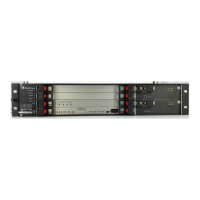
